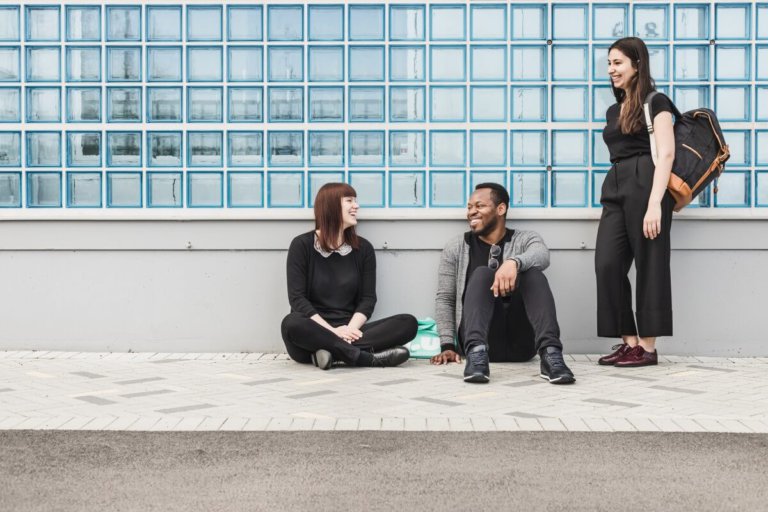
“This ongoing irresponsible behavior will no doubt be remembered in history as one of the greatest failures of humankind.” – Greta Thunberg, Swedish Climate Activist
The consequences of climate change, turbulent international relations, nationalism and intolerance make it hard to stay calm and collected in a world saturated with seemingly unsolvable issues.
To paraphrase Greta Thunberg, we have everything we need to tackle these immense challenges – but we must control our ‘eco-anxiety’ and refuse to indulge in panic.
This is one reason why relevant, current degrees are now more vital than ever. Today’s students will go on to become tomorrow’s world leaders – and they must be well-educated in areas like international politics, migration, social science and technology to solve the world’s pressing problems on a tight deadline.
Linköping University offers innovative education and boundary-crossing research. The students are among the most desirable in the labour market and international rankings consistently place LiU as a leading global university.
Read on to discover how Linköping’s world-class interdisciplinary postgraduate programmes earned the school a top spot in the QS Global World Ranking.
MA in Ethnic and Migration Studies
Linköping’s two-year Ethnic and Migration Studies programme – offered on the stunning Norrköping Campus – merges the humanities and social sciences to address the roles race, ethnicity and migration play in art, healthcare and socioeconomics.

Hazal Tugra
Globalisation and biopolitics are key themes of this course. In addition to analysing the causes of migration and how they affect global economics, healthcare and culture, students also learn how race, ethnicity and migration shape creative expression in visual arts, theatre and cinema.
Study abroad opportunities, research tutorials and internships allow students to put theory into practice. Haqqi, a recent graduate of the programme, completed an internship with Doctors Without Borders. Another student of the course, Hazal Tugra from Turkey, describes her Linköping experience on her blog:
“Before I moved to Sweden to study I was working with refugees in Turkey. That drew my attention to the migration field…So, what is so great about my programme? Open minds foster your creativity.”
Learn more about how this comprehensive course prepares students for local and international positions in government, media and business.
MSc Gender Studies – Intersectionality and Change
Linköping’s Gender Studies Master’s programme equips students with a critical understanding of intersectional gender theory, helping them combat inequality and discrimination in all facets of society.

Lisa Grooteman
Students of this course come from a range of academic and professional backgrounds, including sociology, political science and business administration. The main focus of the course is ‘transformative work’ which prepares students to “actively change, develop and challenge existing norms and structures”.
Students are encouraged to draw from their own experiences and keep reflection journals to deliver powerful written and/or spoken performances, bridging the gap between academic and creative writing.
The tutors themselves also utilise their own research and experiences before sharing them through a mix of online digital classrooms and on-campus meetings.
“From the moment we first met at the first face-to-face week, it was okay to be honest, speak openly and have different ideas. A real feminist bubble was formed,” says Gender Studies alumnus, Lisa Grooteman.
“Apply for the programme. Push boundaries. We need more allies,” boldly proclaims Isabelle Stromstedt, another Linkoping Gender Studies graduate.
MSc International and European Relations
As our world becomes more globalised, our politicians and world leaders will require a thorough understanding of global politics.
Linköping’s International and European Relations course blends history, theory and practice to give students a strong foundation in contemporary European relations, global law and security, and international governance.
The second year of this two-year course offers two pathways, one of which is a guided internship with a relevant international organisation. The course is led by experienced staff who are undertaking current research in international politics, European security, and foreign relations.
“[The programme] taught me that what I think is true does not always have to be true for people from different backgrounds,” says programme graduate, Anke Schwarzkopf.
Find out more about how Linkoping’s International and European Relations programme is helping students from Texas to Pakistan make a positive mark on the world.
MSc Computational Social Science
Linköping’s two-year Master’s in Computational Social Science is all about “the science of human decision-making”. Students will hone their skills in emerging computational techniques – including AI, machine learning and network science – to answer complex questions about society and human behaviour.
Data science, masterfully taught alongside the logic of social inquiry and behavioural mechanisms in social science, equips students with the specialist knowledge needed to address relevant social issues like income inequality and cultural diffusion.
The final year presents optional study abroad opportunities in Spain, Ireland and Germany, to name a few, as well as the Master’s thesis, which allows students to research a complex social science question that interests them.
The course qualifies graduates for highly sought-after roles as data analysts, policy analysts and user experience researchers. Some graduates go on to conduct research through Linköping’s own Institute for Analytical Sociology (IAS).

Benjamin Jarvis
“There are very few – if any – courses that have a social science focus while at the same time giving deep insight into the technical methods of calculation used in front-line research. I’m sure that the programme LiU is offering is unique,” says Benjamin Jarvis, PhD in Social Sciences from UCLA.
Linköping University is calling all changemakers
Students searching for a Master’s programme that will equip them with the knowledge and tools needed to make a real difference should set their sights on Sweden’s Linköping University.
The school’s contemporary, interdisciplinary degree programmes “mix traditional teaching formats with formats that are not found in the conventional academic toolbox”, helping students take on the challenges of today and make the world a better place.
Follow Linköping University on Facebook, Twitter, Instagram and LinkedIn







